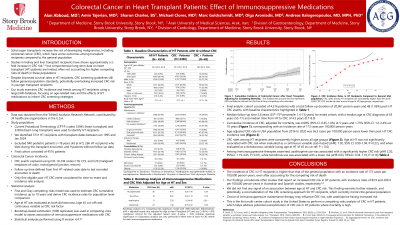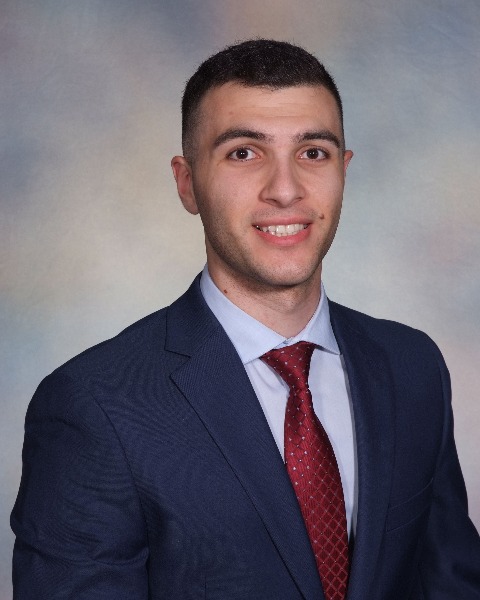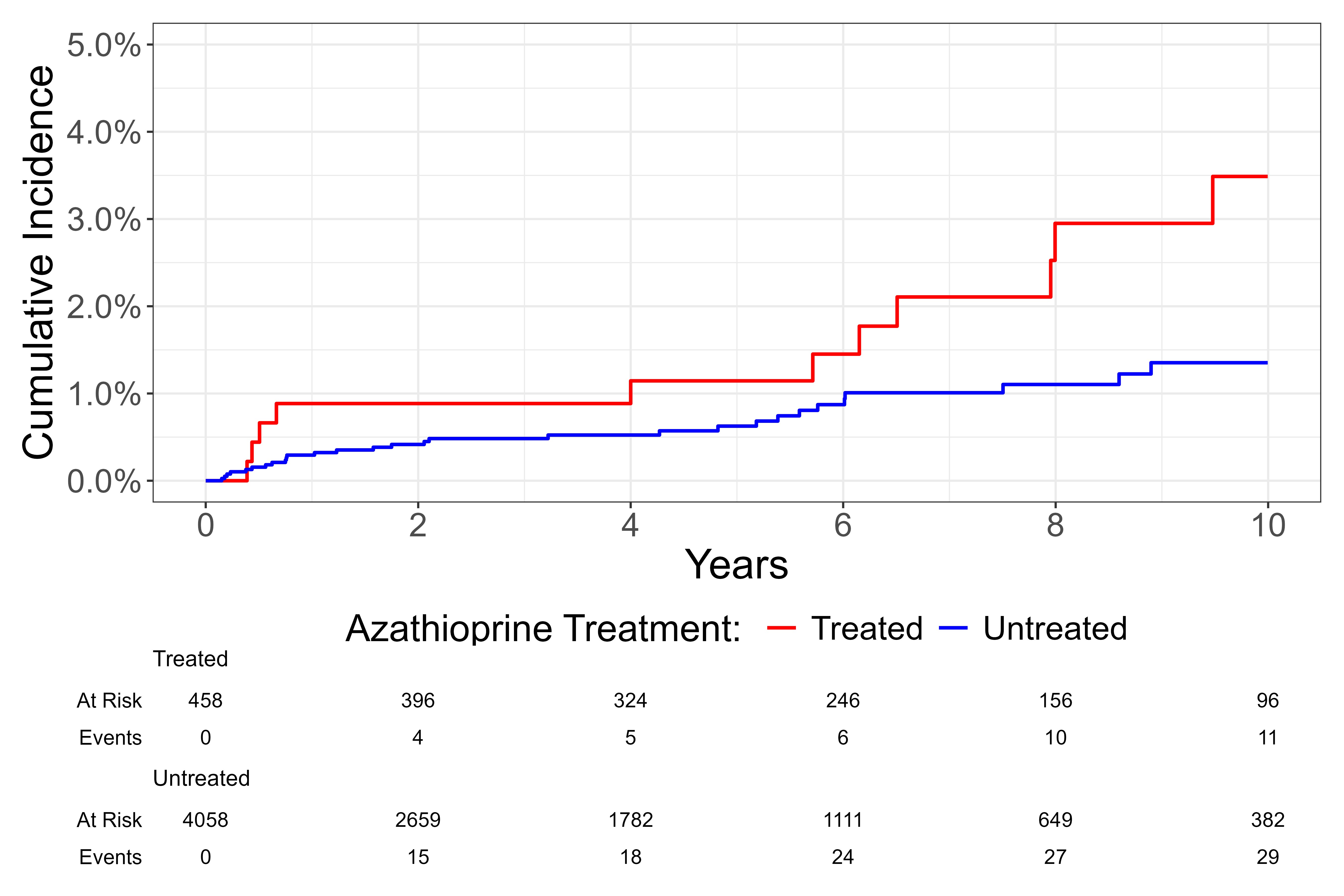Monday Poster Session
Category: Colorectal Cancer Prevention
P2136 - Colorectal Cancer in Heart Transplant Patients: Effect of Immunosuppressant Medications
Monday, October 28, 2024
10:30 AM - 4:00 PM ET
Location: Exhibit Hall E

Has Audio

Alan Abboud, MD
Stony Brook University Hospital
Ramsey, NJ
Presenting Author(s)
Award: Presidential Poster Award
Alan Abboud, MD1, Amin Tajerian, MD2, Sharon Charles, BS3, Michael J. Clores, DO4, Marc Goldschmidt, MD5, Olga C.. Aroniadis, MD, MSc, FACG4, Andreas P. Kalogeropoulos, MD, MPH, PhD3
1Stony Brook University Hospital, Ramsey, NJ; 2Arak University of Medical Sciences, Arak, Markazi, Iran; 3Stony Brook University Hospital, Stony Brook, NY; 4Renaissance School of Medicine at Stony Brook University, Stony Brook, NY; 5Stony Brook University Hospital, Setauket, NY
Introduction: Solid organ transplants are associated with increased risk of malignancies, partially because of chronic immunosuppressant therapy. Advancements in heart transplantation (HT) have led to improved survival, yet long-term data on colorectal cancer (CRC) risk remain limited. In this study, we investigated the incidence of CRC in HT recipients with respect to age and the effects of immunosuppressive therapy.
Methods: We used data from the TriNetX Research Network to conduct a multi-center, retrospective cohort study. We identified patients ≥18 years of age at time of HT using CPT codes for HT (33945) and combined lung-HT (33935). The earliest date of CRC diagnosis was identified using ICD-10 CM codes C18, C19, and C20. The Fine and Gray competing-risks framework was used to estimate CRC incidence and evaluate associations of risk factors with CRC, with mortality as a competing risk. We used bootstrapping for statistical inference in age- and sex-adjusted models. CRC rates were compared to the United States population using the 2016-2020 CDC historical data.
Results: We identified 4516 adults with HT from 1996 to 2024 (Table1). After a median follow up of 3.6 years (25th-75th percentile, 1.4 – 6.7), 48 patients developed CRC. The median time from HT to CRC was 4.5 years (0.7-8.0) and the median age at CRC was 65 years (55-71). The cumulative incidence, adjusted for competing mortality, was 0.68% (95%CI: 0.45%-1.0%) at 5 years and 1.7% (95%CI: 1.2%-2.4%) at 10 years, corresponding to a rate of 170 cases per 100,000 person-years. In comparison, the age-adjusted CRC rate in the US population for the years 2016-2020 was 36.5 cases per 100,000 person-years (95%CI: 36.4-36.6). Age at HT was not significantly associated with CRC risk (P=0.22); patients age < 45 at HT experienced similar risk as those age ≥45. Among immunosuppressant medications, only azathioprine use was associated with a significantly higher CRC risk (aHR 2.12; 95%CI: 1.00-4.84; P=0.05, Figure 1); while tacrolimus (aHR 0.51; 95%CI: 0.25-1.05; P=0.066) was associated with non-significantly lower CRC risk.
Discussion: The incidence of CRC in HT recipients is higher than that of the general population, even after accounting for the competing risk of death. CRC incidence did not differ by age at HT, suggesting that all HT patients should be screened for CRC regardless of age. Choice of immunosuppressive maintenance therapy may influence CRC risk, with azathioprine being associated with increased risk.

Note: The table for this abstract can be viewed in the ePoster Gallery section of the ACG 2024 ePoster Site or in The American Journal of Gastroenterology's abstract supplement issue, both of which will be available starting October 27, 2024.
Disclosures:
Alan Abboud, MD1, Amin Tajerian, MD2, Sharon Charles, BS3, Michael J. Clores, DO4, Marc Goldschmidt, MD5, Olga C.. Aroniadis, MD, MSc, FACG4, Andreas P. Kalogeropoulos, MD, MPH, PhD3. P2136 - Colorectal Cancer in Heart Transplant Patients: Effect of Immunosuppressant Medications, ACG 2024 Annual Scientific Meeting Abstracts. Philadelphia, PA: American College of Gastroenterology.
Alan Abboud, MD1, Amin Tajerian, MD2, Sharon Charles, BS3, Michael J. Clores, DO4, Marc Goldschmidt, MD5, Olga C.. Aroniadis, MD, MSc, FACG4, Andreas P. Kalogeropoulos, MD, MPH, PhD3
1Stony Brook University Hospital, Ramsey, NJ; 2Arak University of Medical Sciences, Arak, Markazi, Iran; 3Stony Brook University Hospital, Stony Brook, NY; 4Renaissance School of Medicine at Stony Brook University, Stony Brook, NY; 5Stony Brook University Hospital, Setauket, NY
Introduction: Solid organ transplants are associated with increased risk of malignancies, partially because of chronic immunosuppressant therapy. Advancements in heart transplantation (HT) have led to improved survival, yet long-term data on colorectal cancer (CRC) risk remain limited. In this study, we investigated the incidence of CRC in HT recipients with respect to age and the effects of immunosuppressive therapy.
Methods: We used data from the TriNetX Research Network to conduct a multi-center, retrospective cohort study. We identified patients ≥18 years of age at time of HT using CPT codes for HT (33945) and combined lung-HT (33935). The earliest date of CRC diagnosis was identified using ICD-10 CM codes C18, C19, and C20. The Fine and Gray competing-risks framework was used to estimate CRC incidence and evaluate associations of risk factors with CRC, with mortality as a competing risk. We used bootstrapping for statistical inference in age- and sex-adjusted models. CRC rates were compared to the United States population using the 2016-2020 CDC historical data.
Results: We identified 4516 adults with HT from 1996 to 2024 (Table1). After a median follow up of 3.6 years (25th-75th percentile, 1.4 – 6.7), 48 patients developed CRC. The median time from HT to CRC was 4.5 years (0.7-8.0) and the median age at CRC was 65 years (55-71). The cumulative incidence, adjusted for competing mortality, was 0.68% (95%CI: 0.45%-1.0%) at 5 years and 1.7% (95%CI: 1.2%-2.4%) at 10 years, corresponding to a rate of 170 cases per 100,000 person-years. In comparison, the age-adjusted CRC rate in the US population for the years 2016-2020 was 36.5 cases per 100,000 person-years (95%CI: 36.4-36.6). Age at HT was not significantly associated with CRC risk (P=0.22); patients age < 45 at HT experienced similar risk as those age ≥45. Among immunosuppressant medications, only azathioprine use was associated with a significantly higher CRC risk (aHR 2.12; 95%CI: 1.00-4.84; P=0.05, Figure 1); while tacrolimus (aHR 0.51; 95%CI: 0.25-1.05; P=0.066) was associated with non-significantly lower CRC risk.
Discussion: The incidence of CRC in HT recipients is higher than that of the general population, even after accounting for the competing risk of death. CRC incidence did not differ by age at HT, suggesting that all HT patients should be screened for CRC regardless of age. Choice of immunosuppressive maintenance therapy may influence CRC risk, with azathioprine being associated with increased risk.

Figure: Figure 1. Incidence of Colorectal Cancer According to Azathioprine Use
Note: The table for this abstract can be viewed in the ePoster Gallery section of the ACG 2024 ePoster Site or in The American Journal of Gastroenterology's abstract supplement issue, both of which will be available starting October 27, 2024.
Disclosures:
Alan Abboud indicated no relevant financial relationships.
Amin Tajerian indicated no relevant financial relationships.
Sharon Charles indicated no relevant financial relationships.
Michael Clores indicated no relevant financial relationships.
Marc Goldschmidt indicated no relevant financial relationships.
Olga Aroniadis indicated no relevant financial relationships.
Andreas Kalogeropoulos indicated no relevant financial relationships.
Alan Abboud, MD1, Amin Tajerian, MD2, Sharon Charles, BS3, Michael J. Clores, DO4, Marc Goldschmidt, MD5, Olga C.. Aroniadis, MD, MSc, FACG4, Andreas P. Kalogeropoulos, MD, MPH, PhD3. P2136 - Colorectal Cancer in Heart Transplant Patients: Effect of Immunosuppressant Medications, ACG 2024 Annual Scientific Meeting Abstracts. Philadelphia, PA: American College of Gastroenterology.

